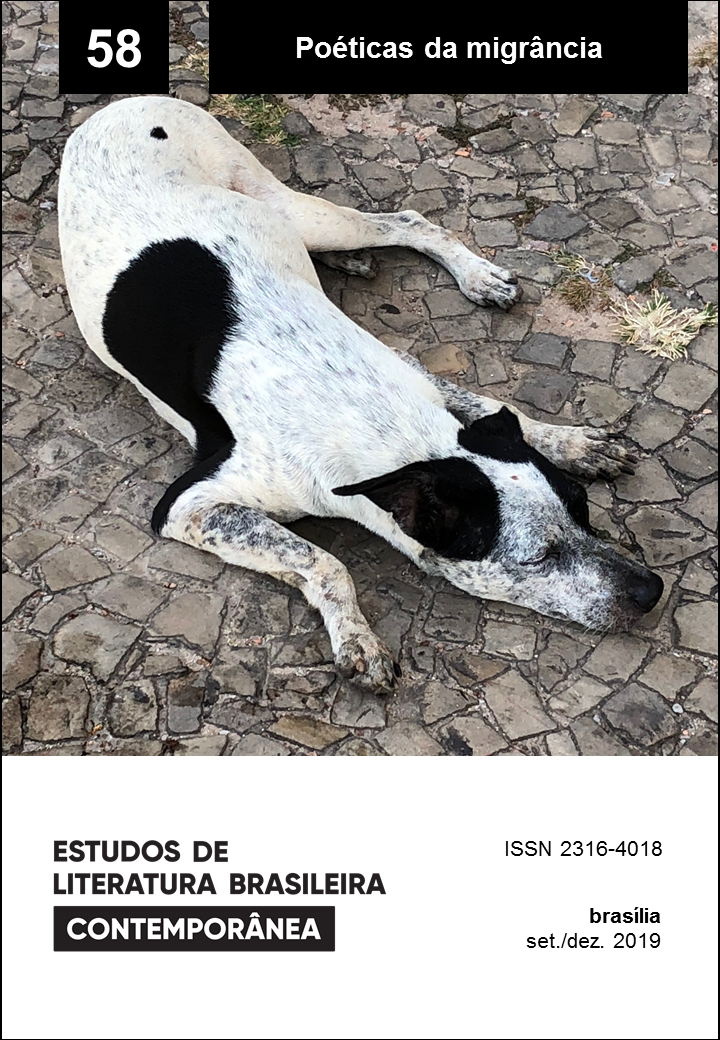The fissile house: the migrant body and the paradoxes of hospitality in the poetry of Eduardo Jorge
DOI:
https://doi.org/10.1590/2316-4018583Keywords:
Eduardo Jorge, contemporary Brazilian poetry, migration, hospitalityAbstract
If the home is the geographic center from which all paths are possible and where the city offers itself up to the individual, then the migrant's experience often alters the perception of this “chez soi” and weakens its opposition to open and shared public spaces. Hospitality can become hostility. This article seeks to examine the instabilities in the representation of domestic space in the recent work of the Brazilian poet Eduardo Jorge. Given his temporary condition ”“ changing addresses, precariously dominating the city and its codes ”“ the migrant portrayed in this poetry often experiences home as reduced to the dimensions of clothing (the most basic form of shelter) and of the body, himself transformed into shell, fossil, elastic, and fissile space.
References
AUGÉ, Marc (2008). Não-lugares: introdução a uma antropologia da supermodernidade. 7. ed. São Paulo: Papirus.
BACHELARD, Gaston (1989). A dialética do exterior e do interior. In: BACHELARD, Gaston. A poética do espaço. São Paulo: Martins Fontes.
BONVICINO, Régis (1999). Céu-eclipse: poema-idéia. São Paulo: 34.
BOSI, Ecléa (1983). Memória e sociedade: lembranças de velhos. São Paulo: T. A. Queiroz.
DERRIDA, Jacques; DUFOURMANTELLE, Anne (2003). Anne Dufourmantelle convida Jacques Derrida a falar da hospitalidade. São Paulo: Escuta.
FERNANDES, Pádua (2016). Poesia e tremor III: treme o corpo em fuga, ou A casa elástica de Eduardo Jorge. In: FERNANDES, Pádua. O palco e o mundo. Blog pessoal, São Paulo, 13 ago. Disponível em: https://bit.ly/2l3k1Kx. Acesso em: 29 jul. 2018.
FOUCAULT, Michel (1978). História da loucura na Idade Clássica. São Paulo: Perspectiva.
GUIMARÃES, Júlio Castañon (2015). Nota breve. In: JORGE, Eduardo. A casa elástica. São Paulo: Lumme.
JORGE, Eduardo (2004). São Pedro. Fortaleza: Edição do autor.
JORGE, Eduardo (2015). A casa elástica. São Paulo: Lumme.
JORGE, Eduardo (2017). La fée du fer à repasser. Curtis Putralk (Viviana Méndez Moya). Site da artista. Paris, 15 mar. Disponível em: http://curtisputralk.com/?p=883. Acesso em: 24 mar. 2019.
JORGE, Eduardo (2018). Teoria do hotel. São Paulo: Demônio Negro.
JORGE, Eduardo; MARQUES, Ana Martins (2017). Como se fosse a casa: uma correspondência. Belo Horizonte: Relicário.
SCHAFER, R. Murray (2001). A afinação do mundo: a paisagem sonora. São Paulo. Ed. da Unesp.
STERZI, Eduardo (2018). Posfácio. In: JORGE, Eduardo. Teoria do hotel. São Paulo: Demônio Negro.
WEINTRAUB, Fabio (2013). O tiro, o freio, o mendigo e o outdoor: representações do espaço urbano na poesia brasileira pós-1990. Tese (Doutorado em Letras) ”“ Universidade de São Paulo, São Paulo. Disponível em https://bit.ly/2kJe1qs. Acesso em: 5 fev. 2019.
WEINTRAUB, Fabio (2018). À sombra dos mourões. Suplemento Literário de Minas Gerais, n. 1.376, jan./fev.
Downloads
Published
Issue
Section
License
Authors who publish in this journal agree to the following terms:
a) The authors maintain the copyright and grant the journal the right of first publication, the work being simultaneously licensed under the Creative Commons Attribution License-Non Commercial 4.0 which allows the sharing of the work with acknowledgment of the authorship of the work and publication this journal.
b) Authors are authorized to enter into additional contracts separately, for non-exclusive distribution of the version of the work published in this journal (eg publish in institutional repository or as a book chapter), with authorship recognition and publication in this journal.
c) Authors are allowed and encouraged to publish and distribute their work online (eg in institutional repositories or on their personal page) after the editorial process, as this can generate productive changes, as well as increase the impact and citation of published work (See The Effect of Free Access).
d) The authors of the approved works authorize the magazine to, after publication, transfer its content for reproduction in content crawlers, virtual libraries and the like.
e) The authors assume that the texts submitted to the publication are of their original creation, being fully responsible for their content in the event of possible opposition by third parties.


